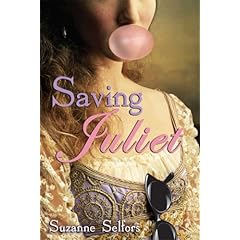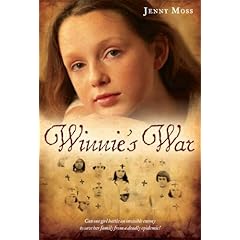I read a few books over the past couple of months that I don’t have too much to say about. These books are all four O.K., maybe more than O.K., but none of them provoked me to verbosity.
Flipped by Wendelin Van Draanen was a toned-down version of Stargirl (Semicolon review here). Boy meets girl (second grade). Girl chases boy (second through seventh grade). Boy runs away, doesn’t appreciate girl. Girl falls out of love as boy begins to appreciate what he’s lost. Recommended by Melanie at Deliciously Clean Reads.
 Saving Juliet by Suzanne Selfors. I had a professor once who said that every time he read Romeo and Juliet he hoped against hope that it would all end differently, that the star-crossed lovers would somehow sort it all out and live happily ever after. In Saving Juliet, Mimi Wallingford, a young actress with problems of her own, magically gets a chance to save Juliet and turn Shakespeare’s tragedy into a comedy. But Mimi, and her leading man, pop star Troy Summer, may not be able to survive long enough in dangerous sixteenth century Verona to do anyone any good. The dialog is kind of hokey, and there are some holes in the plot. Nevertheless, not bad re-imagining. Recommended by Melissa at Estella’s Revenge.
Saving Juliet by Suzanne Selfors. I had a professor once who said that every time he read Romeo and Juliet he hoped against hope that it would all end differently, that the star-crossed lovers would somehow sort it all out and live happily ever after. In Saving Juliet, Mimi Wallingford, a young actress with problems of her own, magically gets a chance to save Juliet and turn Shakespeare’s tragedy into a comedy. But Mimi, and her leading man, pop star Troy Summer, may not be able to survive long enough in dangerous sixteenth century Verona to do anyone any good. The dialog is kind of hokey, and there are some holes in the plot. Nevertheless, not bad re-imagining. Recommended by Melissa at Estella’s Revenge.
 Winnie’s War by Jenny Moss. The setting is a fictional town right here where I live near Friendswood, Texas. The war is World War I and Winnie’s own personal war with her grandmother and with the 1918 influenza epidemic and with growing up. This one is pitched a little younger than the two above-mentioned books; Winnie is twelve years old as the story begins. However, I would give it to middle-schoolers. Here’s an author interview with Ms. Moss at Cynsations.
Winnie’s War by Jenny Moss. The setting is a fictional town right here where I live near Friendswood, Texas. The war is World War I and Winnie’s own personal war with her grandmother and with the 1918 influenza epidemic and with growing up. This one is pitched a little younger than the two above-mentioned books; Winnie is twelve years old as the story begins. However, I would give it to middle-schoolers. Here’s an author interview with Ms. Moss at Cynsations.
Just One Wish by Janette Rallison. Annika is desperate to get the star of her brother Jeremy’s favorite TV show, Teen Robin Hood, to come visit and convince Jeremy that dreams can come true. Jeremy has a big dream, that he’ll get well after his surgery for cancer. And it’s up to Annika to make it come true. Kind of cute, kind of sad, kind of unbelievable, not a bad way to spend an hour or two.
By the way I haven’t ever expressed an opinion on the whole off-with-her-head controversy as it pertains to book covers because I’m not an art critic and the last time I said something negative about the cover art on a book I got in trouble with the author, even though I liked the book itself very much. Let’s just say I much prefer Winnie’s picture to Mimi’s. What’s with the trend toward guillotining protagonists on the cover of their own books anyway?






 It’s one of
It’s one of